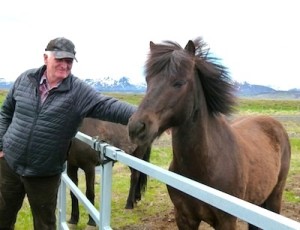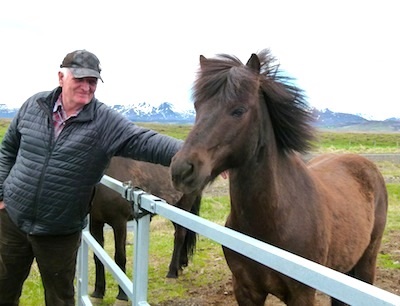Shore Excursion: Icelandic horses purebred back to days of Viking ancestors
 Imagine Iceland without horses, those beautiful short husky creatures that look so striking on the country’s landscape.
Imagine Iceland without horses, those beautiful short husky creatures that look so striking on the country’s landscape.
That’s the way it was until the Vikings came more than 1,000 years ago and brought Nordic horses with them. Although they are smaller than most horses, I learned shortly after arriving in Iceland not to call them ponies.
“Icelanders get very offended when you say they are ponies,” said guide Hermann Guõmundsson. “They are much bigger than ponies.”
Not sure about that. But I will agree that the special Icelandic breed of horses is friendly, spirited, sturdy, intelligent and very important to Icelanders. The horses are known for being surefooted and able to cross rough terrain, which certainly describes much of Iceland.
“There are 75,000 horses in Iceland,” Hermann said. “They are used for sheep herding, for riding and for horse shows.”
Besides their compact size, what makes the Icelandic horse unusual is that it has five walking styles and more than 100 color options. An average Icelandic horse weighs about 800 pounds and stands about 4 ½ feet tall.
The gait of the Icelandic horse is so smooth that it is said that riders could drink a glass of champagne while on horseback and not spill a drop.
The Icelandic breed has developed a double coat for extra insulation in cold weather and has a full mane and tail. That’s why they look so shaggy and huggable, almost like a child’s toy animal.
Along with the typical gaits – walk, trot and canter/gallop – the Icelandic horse has a four-beat lateral ambling gait known as the tölt. It produces great speed very quickly, sort of like a gallop. The tölt lets a rider cover ground very quickly and comfortably. Even a 20 mph speed on a tölt gait can produce a bounce-free ride.
The flying pace is a high-speed gait which can reach up to 30 mile per hour, sort of like flooring your car for fast acceleration. This gait is used only for short distances and can equal the speed of a full gallop. At one interval in the flying pace, all four hooves are suspended off the ground. Amazing animals.
Icelandic horses are long-lived and hardy. In their native country they have few diseases. To help keep it that way, Icelandic law prevents horses from being imported into the country and exported animals are not allowed to return. This also keeps the Icelandic horse a purebred, one of the most purely bred horses in the world, so isolated and exclusive to Iceland for more than 1,000 years.
Story and photo by Jackie Sheckler Finch















View Recent Comments